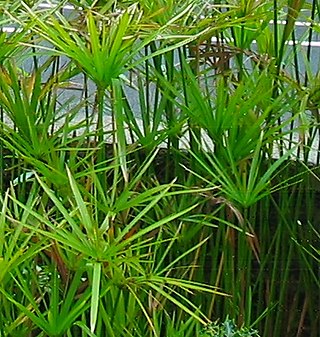
Gentiana is a genus of flowering plants belonging to the gentian family (Gentianaceae), the tribe Gentianeae, and the monophyletic subtribe Gentianinae. With over 300 species, it is considered a large genus. Gentians are notable for their mostly large trumpet-shaped flowers, which are often of an intense blue hue.

Cyperus papyrus, better known by the common names papyrus, papyrus sedge, paper reed, Indian matting plant, or Nile grass, is a species of aquatic flowering plant belonging to the sedge family Cyperaceae. It is a tender herbaceous perennial, native to Africa, and forms tall stands of reed-like swamp vegetation in shallow water.

The Cyperaceae are a family of graminoid (grass-like), monocotyledonous flowering plants known as sedges. The family is large: botanists have described some 5,500 known species in about 90 genera, the largest being the "true sedges" with over 2,000 species.

Dioscorea is a genus of over 600 species of flowering plants in the family Dioscoreaceae, native throughout the tropical and warm temperate regions of the world. The vast majority of the species are tropical, with only a few species extending into temperate climates. It was named by the monk Charles Plumier after the ancient Greek physician and botanist Dioscorides.

Gentianaceae is a family of flowering plants of 103 genera and about 1600 species.

Plumeria, also known as frangipani, is a genus of flowering plants in the subfamily Rauvolfioideae, of the family Apocynaceae. Most species are deciduous shrubs or small trees. The species are native to the Neotropical realm, but are often grown as cosmopolitan ornamentals in tropical regions, especially in Hawaii, as well as hot desert climates in the Arabian Peninsula with proper irrigation.

Cyperus is a large genus of about 700 species of sedges, distributed throughout all continents in both tropical and temperate regions.

Cyperus esculentus is a species of plant in the sedge family widespread across much of the world. It is found in most of the Eastern Hemisphere, including Southern Europe, Africa and Madagascar, as well as the Middle East and the Indian subcontinent. C. esculentus is cultivated for its edible tubers, called earth almonds or tiger nuts, as a snack food and for the preparation of horchata de chufa, a sweet, milk-like beverage.

Cyperus rotundus is a species of sedge (Cyperaceae) native to Africa, southern and central Europe, and southern Asia. The word cyperus derives from the Greek κύπερος, kyperos, and rotundus is from Latin, meaning "round". The earliest attested form of the word cyperus is the Mycenaean Greek 𐀓𐀞𐀫, ku-pa-ro, written in Linear B syllabic script.

Cyperus alternifolius, the umbrella papyrus, umbrella sedge or umbrella palm, is a grass-like plant in the large genus Cyperus of the sedge family Cyperaceae. The plant is native to West Africa, Madagascar and the Arabian Peninsula, but widely distributed throughout the world. It has gained the Royal Horticultural Society's Award of Garden Merit. The subspecies Cyperus alternifolius ssp. flabelliformis is also known as Cyperus involucratusRottb..

Cyperus polystachyos, also known as Pycreus polystachyos, and also called manyspike flatsedge in the US, or bunchy sedge, coast flatsedge, many-spiked sedge or Texas sedge in Australia, is a herbaceous species in the family Cyperaceae, widespread in tropical and subtropical areas around the world, sometimes extending its range into temperate regions.
Reynosia is a genus of plant in family Rhamnaceae. Darlingplum is a common name for this genus.

Cyperus fuscus is a species of sedge known by the common name brown galingale, or brown flatsedge. This plant is native to much of Europe, Asia and North Africa from England, Portugal and Morocco east to China and Thailand. It is an introduced species in North America, where it is naturalized in widely scattered locations in the United States and Canada.

Cyperus scariosus is a perennial herbaceous plant from Australia and New Guinea.

Cyperus laevigatus is a species of sedge known by the common name smooth flatsedge.

Cyperus longus is a species of sedge known by the common names of sweet cyperus and water rush in Africa, or in Britain galingale.

Cyperus flavescens, commonly known as the yellow flatsedge, is a species of flowering plant belonging to the family Cyperaceae.
Cyperus flexuosus may refer to two different plant species:
Cyperus lacunosus is a species of flowering plant in the family Cyperaceae. It is a sedge that is native to western parts of Cuba.














